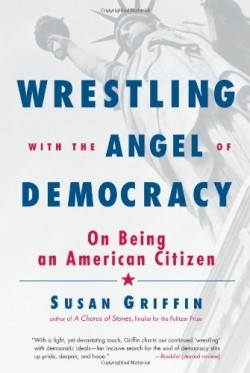
Wrestling with the Angel of Democracy
On Being an American Citizen
“Democracy is a form of government responsive to the people, it is flexible, singing with innovation, ingenuity, riffing on old ideas, the whole process of change accelerated by the creators,” says Susan Griffin in this intriguing book that describes, more than it defines, democracy. Thomas Jefferson, Ralph Waldo Emerson, and Henry David Thoreau weigh in to provide thoughtful commentaries on classic icons of democracy, as well as lesser-known democratic innovators who struggled mightily to advance the ideals of these imperfect visionaries. (Neither Jefferson nor Emerson believed that the blessings of democracy should be shared with African-Americans because of their alleged inferiority, the author states.)
This is Griffin’s third volume in what she calls “social autobiography,” a genre in which the author’s life stories supplement commentaries on the people and the forces that have propelled history in new directions. The author’s first volume, A Chorus of Stones, was a finalist for the Pulitzer Prize and the National Book Critics Circle Award. Griffin has written nineteen books and her play, Voices, won an Emmy. Born in 1943, the author was raised in California and lives in Berkeley.
Although Griffin’s investigation of these democratic luminaries are skillfully written, the book is most interesting for its accounts of ordinary people who rose to do great things. Here, in Howard Zinn-like fashion, she revisits democracy’s dark side, notably the forced removal of Cherokee Indians from their homeland in 1838 and the 1911 Triangle Shirt fire, in which 146 women died because their factory doors were locked to keep union organizers out.
These tragedies are balanced by the life-affirming stories of people like Angeline and Sarah Grimke, eloquent abolitionists and early advocates of women’s rights; union organizer Rose Schniederman, a poor immigrant who rose to advise Eleanor Roosevelt and FDR’s Secretary of Labor Francis Perkins on important social issues; and Jelly Roll Morton, who democratized music through his compositions synthesized from slave rhythms and African and European music.
Griffin’s own story at times becomes repetitive and detracts from her excellent historical narratives. Her life becomes more interesting, however, when she moves away from the dysfunctional family and describes her college years, the civil rights movement, and the gradual acceptance of her own sexuality. Overall, Griffin offers an intellectually satisfying account that shows through the stories of selected historical personalities and her own life that democracy is, and always will be, a work in progress.
Disclosure: This article is not an endorsement, but a review. The publisher of this book provided free copies of the book to have their book reviewed by a professional reviewer. No fee was paid by the publisher for this review. Foreword Reviews only recommends books that we love. Foreword Magazine, Inc. is disclosing this in accordance with the Federal Trade Commission’s 16 CFR, Part 255.
